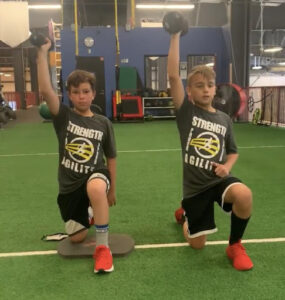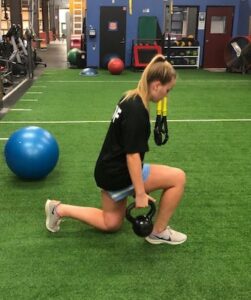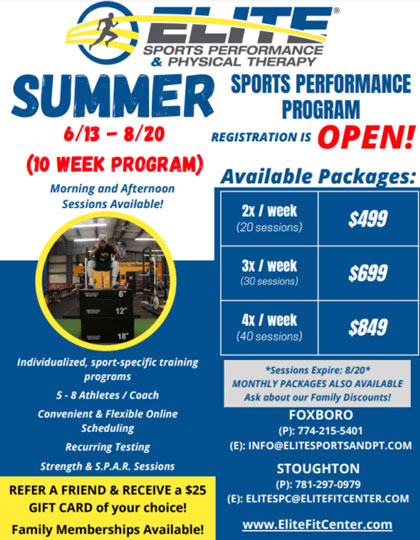The Importance of Strength Training for Athletes in Early Specialization Sports
In this month’s blog post, we discuss the importance of strength and conditioning for athletes who participate in early specialization sports. In the article “Practical Strategies for Integrating Strength and Conditioning Into Early Specialization Sports,” Moeskops et al. focus on the importance of strength and conditioning programs for early specialization sport athletes (2022). Elite’s team of sports performance coaches and physical therapists work with athletes every day who participate in early specialization sports. “Early sport specialization is characterized as an intensive year-round (>8 months per year) training and/or competition, involving participating in a single sport that typically begins in the prepubertal years” (Moeskops et al. 2022).The authors state that these athletes are at a greater risk of an overuse injury than athletes who participate in multiple sports.

In past years, early specialization sports included gymnastics, dance, tennis, golf, and swimming. However, in more recent years, sports such as baseball, softball, soccer, basketball, and hockey have been added to the early specialization mix. Many believe that allowing athletes to specialize in a single sport early in their development will increase their chances of outperforming their peers who may be participating in other sports or other extra-curricular activities. With this commitment level to a single sport comes long hours of sport specific training and limited time for athletes to explore other interests. The trend toward early sport specialization is increasing, with more young athletes specializing in a single sport and a lack of awareness of the potential risk factors that come along with this early specialization. With the increase in participation comes the greater risk of physical, physiological, and psychosocial issues for the athlete (Moeskops et al. 2022).
Research suggests that early specializing sport athletes have a greater chance of sustaining an overuse injury due to the athlete constantly performing the same movement patterns in their sport. This is why young swimmers frequently have shoulder injuries and dancers have low back injuries. “Overuse injuries in early specialization athletes are likely to be more avoidable than acute-type injuries, with an estimated of ~50% deemed preventable in youth with appropriate training and management” (Moeskops et al. 2022).

In hopes of reducing the risk of injury in these athletes, it has been recommended by the American College of Sports Medicine for these athletes to participate in a well-rounded general fitness program (Sugimoto et al. 2017). The strength and conditioning program should replace sport-specific training, rather than be an addition to the athlete’s current volume for the week. It is recommended that early specialization sport athletes should “not participate in more hours of sports per week than their chronological age or greater than maximum of 16 hours per week” (Moeskops et al. 2022).
In regards to the early specialization sports athletes’ strength and conditioning program, it is recommended that the strength coach create a program for 2 days per week and focus on developing foundational movement patterns that the athlete is not exposed to during their sport (Moeskops et al. 2022). The strength and conditioning programs for these athletes also should include changes for the athlete to increase their self-confidence and resilience to aid in their development.
Should an early specialization sport athlete suffer from an over-use injury, Elite also offers Physical Therapy to evaluate and treat the injury through a well developed rehabilitation plan that will return the athlete to their sport and reduce the risk of the injury in the future.
To recap what we have learned from Practical Strategies for Integrating Strength and Conditioning Into Early Specialization Sports by Moeskops et al.:
- Early sport specialization = intensive year-round training (>8 months) training and/or competition in a single sport.
- Early sport specialization athletes are at a greater risk of overuse injuries.
- Early sport specialization athletes should perform a well-rounded, well-designed strength training program 2 days per week.
- Strength and conditioning programs should include exercises that train movement patterns that are not used commonly in the athlete’s sport to develop a well-rounded athlete.
- 50% of overuse injuries in these athletes are preventable with proper strength and conditioning.
- Early sport specialization athletes should participate in their sport no more than their chronological age of hours per week (included their strength training) with a cap of 16 hours per week.
- If an athlete experiences chronic pain or sustains an injury, the athlete should seek medical attention for a rehabilitation plan.
We hope you enjoyed this installment of our Sports Performance blog series! If you or an athlete in your family would like to join the Elite Sports Performance community, we offer personalized, comprehensive Sports Performance and Athlete Training programs at both our Foxboro and Stoughton locations. To learn more about our programs for athletes of all ages and sports and how YOU can improve your strength, power, and resilience to injury in the process, click HERE or email us at EliteSPC@EliteFitCenter.com!

References:
Sugimoto, Dai PhD, ATC, CSCS1,2,3; Stracciolini, Andrea MD1,2,3; Dawkins, Corey I. MS, ATC1,2; Meehan, William P. III MD1,2,3; Micheli, Lyle J. MD1,2,3 Implications for Training in Youth: Is Specialization Benefiting Kids?, Strength and Conditioning Journal: April 2017 – Volume 39 – Issue 2 – p 77-81 doi: 10.1519/SSC.0000000000000289
Moeskops, Sylvia PhD, CSCS1; Oliver, Jon L. PhD1,2; Read, Paul J. PhD3,4,5; Cronin, John B. PhD2; Myer, Gregory D. PhD6,7,8,9; Lloyd, Rhodri S. PhD, CSCS*D, FNSCA1,2,10 Practical Strategies for Integrating Strength and Conditioning Into Early Specialization Sports, Strength and Conditioning Journal: February 2022 – Volume 44 – Issue 1 – p 34-45
doi: 10.1519/SSC.0000000000000665
